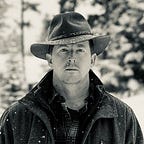Christmas Long Ago
Each time I saw Melissa, I knew she thought of him. She was on set the night of his accident.
When December rolled around that year, Mom and I headed over Coldwater Canyon to Aunt Barbara’s Christmas party. She was the daughter of Harry Crane, a golden age of Hollywood screenwriter who wrote The Honeymooners.
I was warned never to disrupt the poker game he hosted for his friends during that event. They all looked alike to me, and I’d stare at that round table, watching them smoke their big cigars, listen to them crack dirty jokes, and age. It got smaller each year until nobody was left to shuffle the deck.
Barbara’s oldest daughter, Melissa, would float in about a third through the night. She was glamorous and adopted, like me. Mom was “Auntie Ellie” to her and, like much of America, had watched her grow up playing Laura Ingalls on Little House on the Prairie. The first time I remember being there was fourteen years after my brother’s death. Each time I saw Melissa, I knew she thought of him. She was on set the night of his accident.
“Rafael Albert. I loved your brother,” she’d say, bending down and kissing me on the cheek before sending me down to see her little sister Sara.
I walked down that hallway alone, hearing the adult laughter fade behind me and the ruckus coming from Sara’s room. It was like the set of The Toy, the size of a living room, with a sitting area and every amusement imaginable. When it came to her mother’s parties, though, Sara was a recluse, forced to put up with kids like me relegated to her bedroom while their parents hobnobbed. She lay on her bed reading and hardly spoke, treating me like a leper. It was unpleasant, feeling unwelcome every year at Christmastime.
Our mothers routinely partnered us up. But no matter where we went together, I felt invisible to Sara, whether at a Christmas party or lost on a cold street in Russia. She wasn’t cruel, but she never let her guard down. On the rare occasion that she’d invite me somewhere, it was always at her thoughtful mother’s behest.
That following summer, she was tasked with keeping her eye on me at Mountain Meadow Ranch, a sleepover camp outside Reno, Nevada. I would’ve been happy had she treated me like a pesky little brother, but she barely acknowledged my existence throughout the years we camped there. When she did say hello, it was with a boyfriend who relentlessly mocked me. I shouldn’t have taken it personally, but I was young and malleable. Nobody had ever made me feel so small by saying so little.
I never understood why she was so aloof. I’d like to believe she kept her distance because she knew the secret of my adoption, and hiding things from others made her uneasy.
Camping was the best thing to happen to a boy who’d only known city life. I spent most summers on that ranch fishing and horseback riding. But it was designed to instill a work ethic, too. At the end of each day, they had me feed their pigs, trudging a quarter mile up a dirt hill with buckets of slop from the commissary to dump in metal troughs outside the barn. It was a dirty job, and I loved it.
I was also hitting puberty and unaware that my past was subconsciously gnawing at me. It manifested in repugnant behavior, lasting almost until I learned I was given up for adoption. Rejection often precipitated my misogyny — initially at that summer camp by a country girl named Heather who’d taught me to ride an English saddle in the horse ring. I still recall how her jet-black hair blew in the wind as she rounded the barrels. She was my first crush. I’d lie awake each night, looking out my window toward her cabin, thinking about what she might be doing.
It took every last ounce of courage to approach her at the dance on the last night of camp.
“Heather,” I said, my voice cracking.
“Your zipper,” she replied, noticing I’d left my barn door open.
“Oh, thanks,” I responded and foolhardily continued, “Do you — ”
But she shook her head and walked away. As if we’d never met.
I imploded.
Had she said no, or at least let me finish, her refusal may have been easier to stomach. But she just left me standing there with tears welling. I took revenge by shouting obscenities at her as we hiked back to our cabins — words that should never come from any child’s mouth.
“Everyone knows you’re a $%@!, Heather!” I growled like a dog.
The brutish chants which echoed across the meadow. But while it was too late to be sent home, I knew I’d never be invited back. My parents were rightly disgusted with my behavior. I was acting out and so sadly broken. I didn’t know how else to ask for help. It was the beginning of an inkling too, that a monster was hiding inside me. Had I known earlier of my adoption, it may have been unmasked. But I remained a lost boy and later a bewildered young man imprisoned by that old lie.
This excerpt is from the new book, The Bastard of Beverly Hills, available at Amazon, Barnes & Noble and Audible.
